Clint Eastwood has one of the longest running careers in Hollywood from his uncredited appearance in 1955’s Revenge of the Creature to this weekend’s The Mule. His face is eternally recognizable across dozens of films and early TV shows, but he’s also built a successful filmography as a director. The Mule is his 37th film in that role so we thought we’d take a look back at the highs and lows of his previous directorial efforts.
Keep reading for a ranked look at Eastwood’s 36 prior films as decided on my Kieran Fisher, Luke Hicks, and myself.
![]()
36. The 15:17 to Paris (2018)
Eastwood’s 36th film is an abomination and a clusterfuck of bad choices starting with the very first — deciding to make a movie about sixty seconds of spontaneous heroism. No one disputes that the three young Americans who stopped an attempted terrorist bombing on a European train are heroes, but the story of what brought them to that particular moment is no story at all no matter how hard Eastwood tries to make it one. Flashbacks intercut with the present to show how good these boys are, and it’s just ninety minutes of who gives a shit. And topping it all off? Eastwood casts the real men instead of actual actors. These colors don’t run, but they also don’t know how to act.. – Rob
35. Jersey Boys (2014)
Debatably Eastwood’s most uninspired, phoned-in directorial effort, Jersey Boys is for those who are hopelessly addicted to the worst aspects of sterile Hollywood filmmaking and can only get their fix through mainlining its worthless drivel for two hours straight. I hope someone makes a good version of this someday because the brilliant piece of musical theater deserves much better. – Luke
34. Hereafter (2010)
The second of Eastwood’s consecutive collaborations with Matt Damon (after Invictus), Hereafter holds almost no emotional weight for its hyper-dramatic premise. There is something interesting about Eastwood’s choice to direct a film that gives no answers considering he is usually shoving answers down his audiences’ throats as a director, but that maturity of storytelling isn’t enough to keep an otherwise jejune film afloat. It’s definitely a watch-checker, and that’s coming from someone who salivates at the opportunity to watch Barry Lyndon (1975) back-to-back if given the chance. – Luke
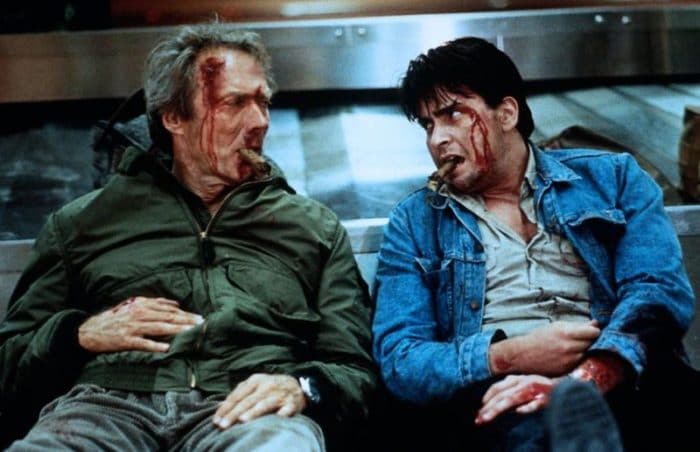
33. The Rookie (1990)
Charlie Sheen was a promising actor who made some enjoyable movies before “tiger blood” and some well-publicized media scandals. It’s true! This wasn’t his best outing during this golden age, nor is it Clint’s, but as a buddy action/comedy with some entertaining set-pieces it’s passable. – Kieran
32. Absolute Power (1997)
The setup behind this adaptation of the David Balducci bestseller is solid, high-concept fun as a thief on a job witnesses the President of the United States murder a woman. It’s what comes next that tanks the film as story turns champion idiocy over entertainment at every juncture. It’s a shame as the talent Eastwood assembles here is legendary with William Goldman writing the screenplay and a cast that includes the likes of Gene Hackman, Ed Harris, Laura Linney, Scott Glenn, Dennis Haysbert, and Judy Davis. Absolute Power? Absolute Meh. – Rob
31. Invictus (2009)
With an unbreakable ceiling of slightly above average performances and two metric shit tons of schmaltz, what is otherwise a remarkable true story about Nelson Mandela and the South African rugby team feels so bloated by Eastwood’s heavy Hollywood treatment. It is as tonally and aesthetically predictable as a studio executive’s marketable vision, a perfect example of what will always hold Eastwood back from being in that highest directorial tier despite having made several great films. No creative risks are taken. – Luke
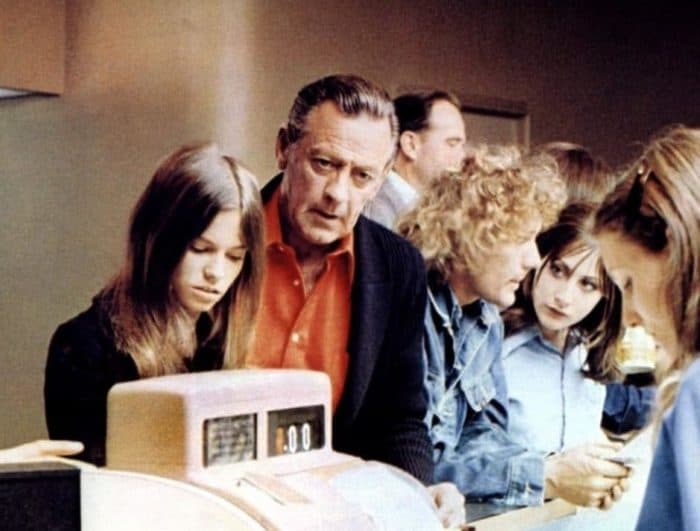
30. Breezy (1973)
Few films in Eastwood’s directorial career feel more atypical than this romantic drama about a straight-laced, middle-aged man and the teenage girl he falls in love with, and while he’s made far worse features it’s no surprise that it took him more than two decades before returning to this genre with The Bridges of Madison County. Older men and younger women are commonplace in fiction (and reality), and the film brings nothing new to the discussion. William Holden and Kay Lenz are talented performers, but their relationship never feels all that romantic or sexy. Lolita it ain’t. – Rob
29. J. Edgar (2011)
Perhaps the most disparate film in Eastwood’s oeuvre when considering expectation and reality, J. Edgar‘s failure will always be a bummer. I, like many, thought this would be a top film of the year, if not the decade. Leo, Naomi Watts, Armie Hammer, goddess Judi Dench, Milk screenwriter Dustin Lance Black, not to mention its subject: the most powerful, controversial U.S. intelligence executive in the 20th century. Eastwood can’t match DiCaprio’s electrifying performance and it becomes sad to watch. You feel bad that Leo wasted his effort on what is little more than one huge missed opportunity. If you can stomach the loss, it’s worth watching for the performances. – Luke
28. White Hunter Black Heart (1990)
White Hunter Black Heart misses on a pretty wide scale, refusing to reason with plot development (in a stubborn, not ambitious manner) and employing a good deal of bland tropes. Lines like “You got to fight when it’s the right thing to do, or you feel like your gut is full of pus” are deliriously stupid, and there are lots of them. But I would be remiss to not beg you to watch it in a sort of campy vein. Why? Because Clint Eastwood *is* John Huston. Well, a John Huston proxy anyway. The plot of the film is essentially the making of Huston’s The African Queen (1951), the screenplay penned by Huston’s screenwriter for the film. Eastwood even does the iconic voice! And, I admit, there are some genuinely interesting ruminations on the grueling creation process of an artist. – Luke
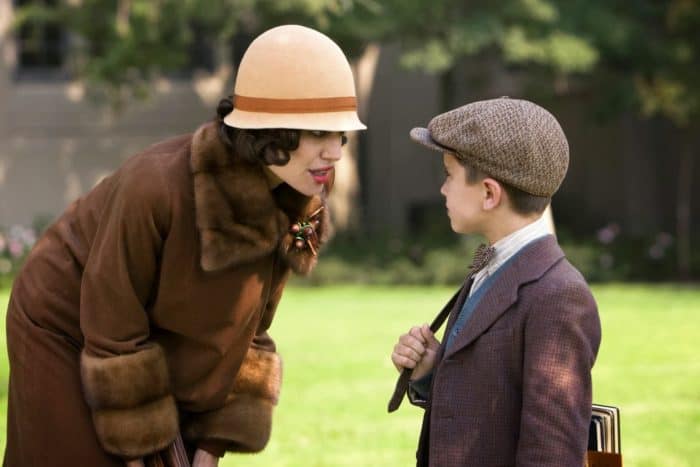
27. Changeling (2008)
With a stunning lead performance from Angelina Jolie as a tormented, broken-hearted mother, Changeling is an Eastwood underdog when it comes to his directorial work. I’m sure I sound like a broken record, but its main flaw is Hollywood cheese — something Eastwood has clung to so tightly in the 21st century. However, it’s not as overwhelming as some of his others, and with the theme of mystery surrounding a lost child in the forefront, overly dramatic expression seems warranted at all times. It’s also a pristine example of period piece production. – Luke
26. Blood Work (2002)
The third of Eastwood’s contemporary thriller adaptations (along with Absolute Power and True Crime), this is as harmlessly solid a suspense picture as you’re likely to find. Eastwood plays an ex-FBI profiler who gets a heart transplant and then starts shtupping the sister of the heart’s original owner. It’s a love story! The woman was murdered, though, and the killer has a few more names on his list. It’s a thriller! The killer’s identity is a tad predictable, but it’s a perfectly adequate ride to his unveiling. – Rob
25. The Eiger Sanction (1975)
Jonathan Hemlock is a badass name made even badass-ier by his dual career choice as an art professor and assassin, and if you’re thinking the character already feels far too suave for Eastwood’s typically stoic and stiff acting style you’d be right. But Eastwood doesn’t care as he’s here to have fun with a pulpy premise involving revenge, deception, sexy ladies, and some stunning locales. It’s a pretty silly movie at times, and it definitely overstays its welcome at nearly 130 minutes, but it’s a good time if you know what you’re in for. – Rob
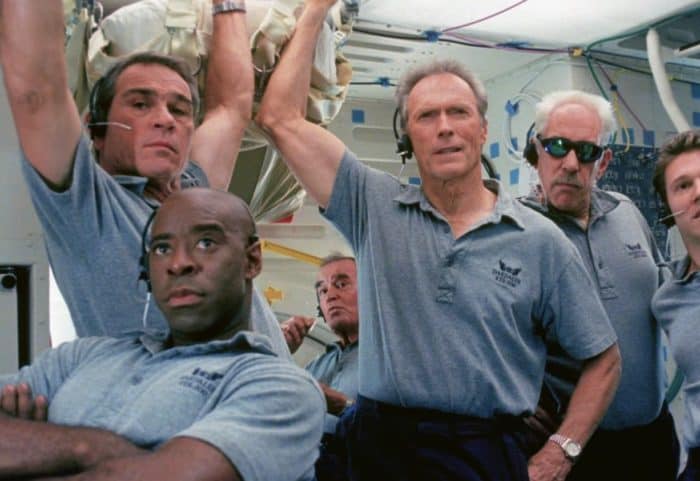
24. Space Cowboys (2000)
I love movies about the elderly embarking upon grand adventures. Age is irrelevant. Sure, our bodies slow down as we get older but that doesn’t mean that we still can’t make the most of our twilight years. Some of Eastwood’s characters are proof of this, and Space Cowboys might just be the most fun film he’s directed to date which explores this idea. The story follows four senior astronauts — Eastwood, James Garner, Tommy Lee Jones, Donald Sutherland — as they embark on one last mission beyond the stars to save a failing satellite. Can the stress old old age cope with the rigorous demands of outer space? Heck yes. – Kieran
23. True Crime (1999)
Eastwood plays a journalist well past his prime who finds himself tasked with covering a simple execution, but the more he digs into the story the less simple it becomes. Andrew Klavan’s novel gets a competent adaptation here, but it’s somewhat lacking in energy. The notes feel too familiar en route to the expected ending, and while this doesn’t make it a bad film by any stretch it leaves it feeling unnecessary. – Rob
22. Honkytonk Man (1982)
This uncle and nephew picture is a proxy for what is actually a father and son picture. Clint plays a drunk, tender, anti-Eastwood uncle who dreams of playing Nashville’s Grand Ol’ Opry. His son, Kyle, plays the tag-along nephew that drifts around with him on the road. In essence, it is a touching road movie that shares many-a-theme with the likes of A Perfect World, the film he would make 11 years down the road. Nothing about Honkytonk Man is particularly remarkable, but it’s primed for a feel good watch if you’re in the mood for one, and it carries the relatable sincerity of Eastwood’s older work – Luke
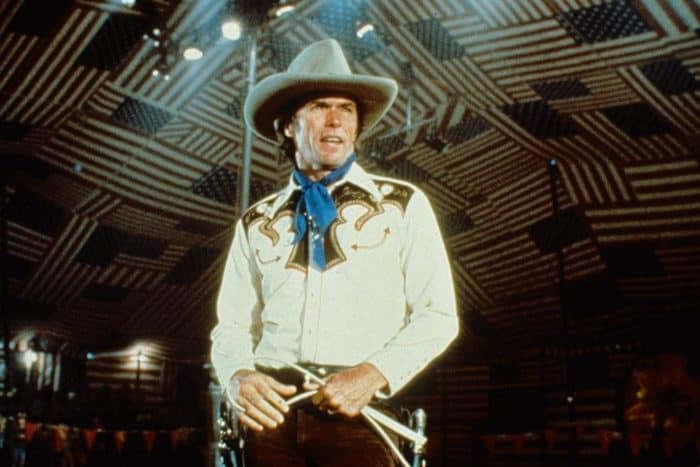
21. Bronco Billy (1980)
Eastwood has challenged his persona as on-screen cowboy more than once, most famously with 1992’s Unforgiven, but this far lighter fare deserves some attention too. He plays an ex-con who runs a ragtag carnival troupe that he headlines as a trick-shooter, and the film is at its best when it focuses on their challenge to survive in modern times. It stumbles, though, trying to build a romance between Billy and a snotty socialite on the lam played by Sondra Locke. It just doesn’t work, and it drags the fun and vitality at every turn. Still, seeing the empathy Eastwood brings to the character is something worth watching. – Rob
20. Play Misty for Me (1971)
For his directorial debut, Eastwood unleashed a psychological thriller about a one-night stand that goes tits up for a fuckboy when the keen woman (Jessica Walter) he gets jiggy with takes a liking to him. She then refuses to leave him alone, which creates a bit of a headache for our dude — especially when an old flame re-enters his life. As an entry in the deranged stalker genre, it’s pretty decent and arguably ahead of its time. Moral of the story: Only hook up with people you trust. – Kieran
19. Heartbreak Ridge (1986)
Eastwood loves patriotism and admires military veterans. He’s also not too fond of young whippersnappers, because they don’t have respect for the elders. Heartbreak Ridge, which sees Clint also star as a grizzled military commander charged with getting a regiment into shape, is a culmination of all these values. There’s a lot of funny dialogue in this one, but it’s fairly standard action/drama fare overall. – Kieran
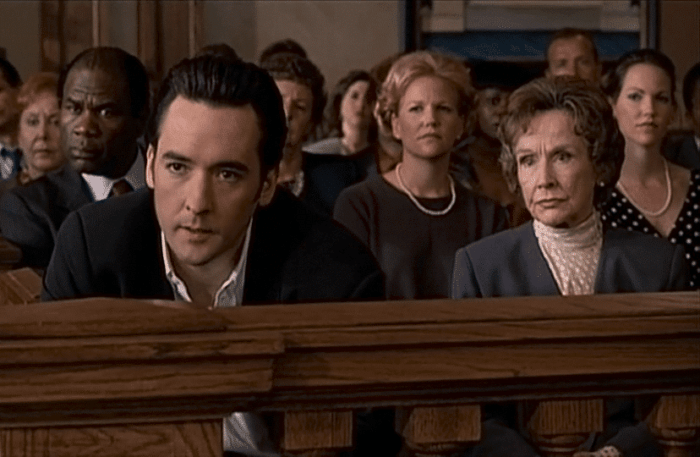
18. Midnight in the Garden of Good and Evil (1997)
The John Berendt book on which this movie is based is an odd one. It’s presented as non-fiction, yet it’s so steeped in southern Gothic sensibilities and populated by a host of eccentric characters that it reads like a murder mystery novel. In the movie, John Cusack plays a journalist who travels to Savannah, Georgia and becomes engrossed in a local murder trial concerning a wealthy businessman and his dead lover. By no means is this Eastwood’s finest hour, but it deserves some reappraisal. – Kieran
17. Sully (2016)
Like so many of Eastwood’s 21st century films, Sully is about its incredible subject, Chesley Sullenberger, the pilot who landed a crashing plane on the Hudson River in a successful attempt to save those on board. Don’t come for the direction (or even the screenplay) but for Tom Hanks’ terrific performance as the fearless pilot, and the inspiration it will infuse in you. – Luke
16. Firefox (1982)
Remember when there was friction between Russia and the United States? Me neither. However, in this somewhat entertaining thriller, there is some beef between both nations. So much so that the Russians have invented a super warplane, which Clint’s pilot protagonist must steal before things get out of hand. This is perhaps the most absurd movie in Eastwood’s directorial filmography, but that’s not necessarily a bad thing. – Kieran
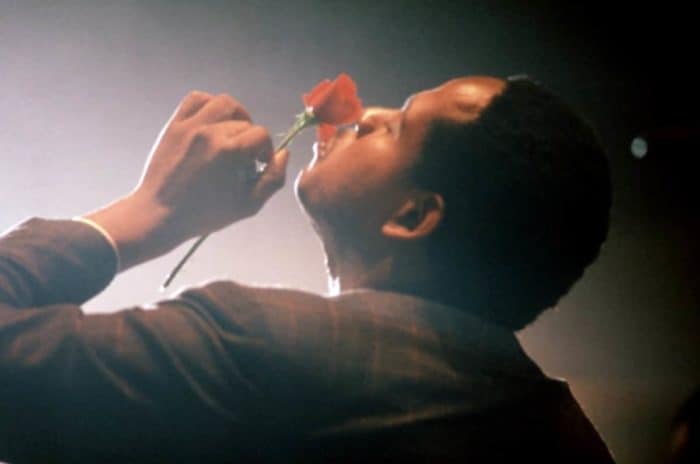
15. Bird (1988)
Once again, Eastwood centers another film on a dynamite performance, this time from Forest Whitaker as the famed jazz musician Charlie “Bird” Parker (who collected the Best Actor prize at Cannes). It earns its epic 161 minute runtime with Whitaker’s performance and the innate emotion of the sensational jazz music that acts as a supporting character to Parker himself and lures the audience in with great poise. If it weren’t for the horror of Jersey Boys, I’d say music biopics might inconspicuously be Eastwood’s greatest directorial talent. But we all know it’s wars and westerns. This is just a wonderful anomaly. – Luke
14. Sudden Impact (1983)
Eastwood leads as the stereotypical tough guy, this time reprising his role as Dirty Harry. He directs with a similar “badass” approach. The film wears this direction on its sleeve. It’s thrilling and non-stop in pace, but relatively empty in content. This is the kind of film that you come to for top notch 80s action. But it’s safe to say that it probably won’t end up aging too well in the #MeToo era. It’s also safe to say that men who haven’t experienced rape should probably stop making movies about women who have. – Luke
13. American Sniper (2014)
The true story of a Navy SEAL’s journey as an American hero is an effortlessly compelling one thanks both to its real hero and the lead performance by Bradley Cooper. We feel his struggle with his role as a death-dealer, especially one who cuts down lives from afar, and while its surface sheen suggests a rousing cry for “Americuh” it’s actually something far more personal. There are bumps, though in some of its observations, but all of them pale beside the ridiculous decision to use and show the most obvious fake baby in film history. It’s so bad the film deserves to rank far lower on this list, but I was overruled by Kieran and Luke for some reason. – Rob

12. The Bridges of Madison County (1995)
Based on Robert James Waller’s best-selling novel of the same name, this is Clint at his most sentimental and romantic. Who says this tough old mutt doesn’t have a romantic side? The story is about a love affair between a middle-aged housewife and a photographer who briefly visits her hometown and steals her heart. She documents the details in a diary, which her kids read years later. If the movie teaches us anything, it’s that sometimes true love comes along when you least expect it. – Kieran
11. A Perfect World (1993)
Eastwood’s pairing with Kevin Costner is easily among his top five films (if this was my solo ranking) as it captures the feeling of a modern day western with both affection and thrills. Costner plays a fugitive on the run with a sadistic partner and a young boy as a hostage, and with Eastwood’s Texas Marshall on their trail it leads to a violent yet heartfelt showdown. Fathers and sons are at the heart of the characters’ journey here, and the themes hit home without interrupting the entertainment. – Rob
10. Flags of Our Fathers (2006)
It is a sobering and gut-wrenching look at the “honor” of war heroes that, in reality, is more like the grueling, all-consuming torture of PTSD. Its ability to make the viewer reconsider such an iconic moment in American history is uncanny. That Eastwood could make a film like this and follow it up less than a decade later with the glorification of war (albeit directed exquisitely) in American Sniper is worth the attention of someone who is looking to do some in-depth film history profiling. It also gets extra credit for its apt companionship with Letters from Iwo Jima. – Luke
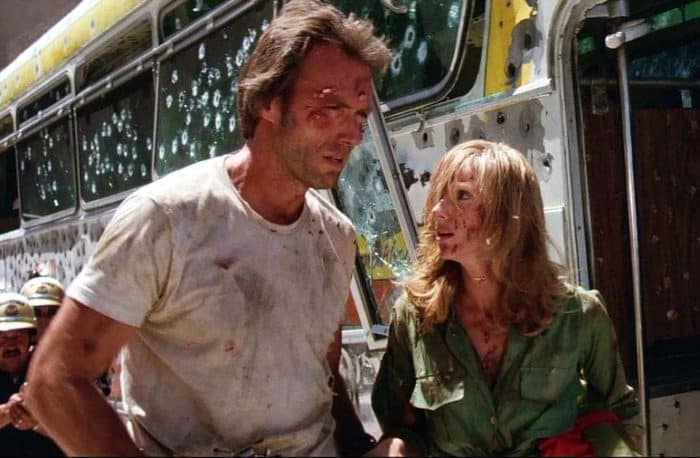
9. The Gauntlet (1977)
It’s simple. Eastwood is a cop who needs to transport a witness (Sondra Locke) from Las Vegas to Phoenix, and with mobsters, gang members, and cops both dirty and clean on their tail it’s a road trip like no other. This is pure B-movie carnage as thousands of bullets are fired, vehicles are wrecked, and the pair plow their way into downtown Phoenix. It’s a beautiful thing that never grows old. – Rob
8. High Plains Drifter (1973)
This stunning and endlessly dark slice of western/horror is my favorite of Eastwood’s films by a blood-soaked mile. It seems at first like his usual “man with no name” fare as his quiet cowboy rides into a tiny town desperate for help in their fight against a band of outlaws. They’re going to regret asking him for an assist. The film is so relentlessly grim with a wicked streak of black comedy — so black some might not even see the comedy — and it builds to a killer third act and a haunting denouement. This is a classic western, a classic horror film, and one of Eastwood’s absolute best achievements. – Rob
7. Gran Torino (2008)
Eastwood — as a man and filmmaker — has often been criticized for his ‘Murican ways and political incorrectness. Understandably, he’s not for everyone and that’s fine. Gran Torino, though, is a nuanced work which proves there’s more depth to his sensibilities than some naysayers would have you believe. In this one, he plays a racist war veteran who ultimately befriends his Korean neighbors and discovers that they’re more alike than he originally thought. At its heart, Gran Torino is a story about healing old wounds, overcoming hatred, and promoting tolerance. – Kieran
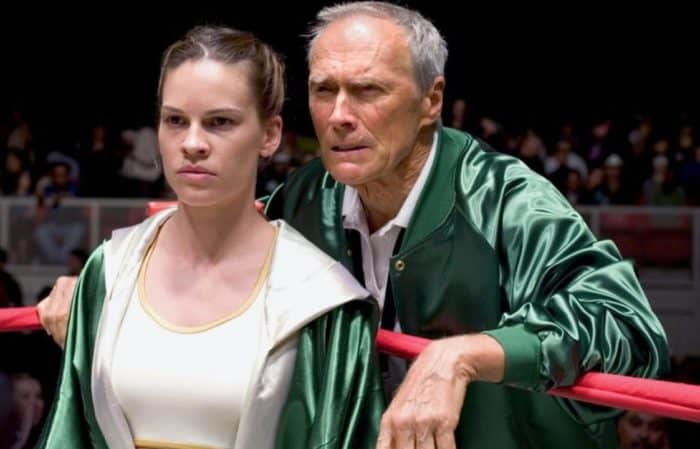
6. Million Dollar Baby (2004)
Even in 2018’s cinematic landscape, boxing movies are still very male-centric. In 2004, though, old Clint subverted the trend by focusing the story on a female fighter. Here, he also plays a hardened coach who decides to train an unlikely fighter (played by Hilary Swank) because he respects her determination. In many ways, Million Dollar Baby is a cliched drama that sticks to the formula that’s defined boxing movies throughout the years. But the film also tackles some pretty heavy subject matter with delicacy and delivers some knockout blows as a result. – Kieran
5. Pale Rider (1985)
Here we have another Western about a mysterious outsider who stands up to corruption in a small town. Needless to say, Pale Rider boasts a story that had been told a thousand times before prior to its creation, but few actors and directors know the genre better than Eastwood meaning the end results are an entertaining effort that hits the sweet spot. – Kieran
4. The Outlaw Josey Wales (1976)
Well if this just isn’t one of the best gosh darn revisionist Westerns ever made. In this one Eastwood plays the titular character who, fueled by his hunger for revenge, joins the Civil War crusade so he can kill the Yankees that murdered his family. When the war ends, he finds himself on the run with a price on his head. As he seeks to evade capture and build a better life, he meets a new group of people and heads for Texas. Through this journey, he begins to find a newfound purpose and desire for redemption. All in all, a stunning achievement. – Kieran
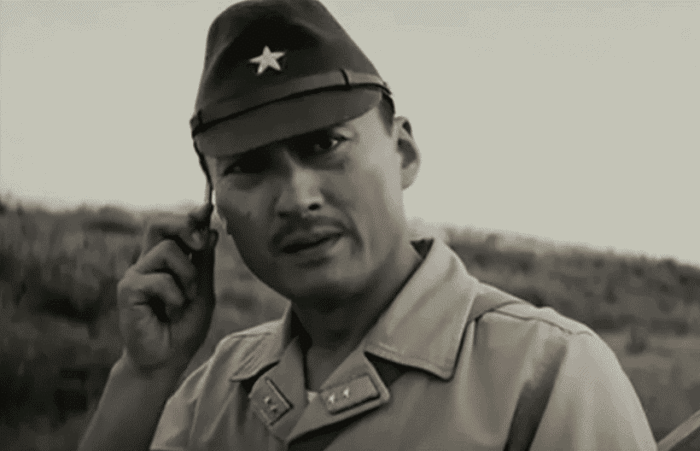
3. Letters from Iwo Jima (2006)
One of Eastwood’s best and most singular approaches to directing, Letters from Iwo Jima is a sympathetic look at Japanese forces fighting to hold the island of Iwo Jima during World War II. It is a paralyzing story of loss from the perspective of the “other side” that is so out of character for Eastwood, yet so beautifully executed on every level. It serves as the superior of the two opposite-sided companion films — the second being Flags of Our Fathers — which is saying quite a bit. How and why Eastwood dipped out of his characteristic mode of plain, tedious, 21st century film-making and overplayed drama is a mystery to me. Maybe this is truly what it looks like when he has full creative control? – Luke
2. Mystic River (2003)
Eastwood’s adapted more than a few novels over his career, but his film of Dennis Lehane’s fantastic novel does a tremendous job capturing its characters, neighborhoods, and story nuances. Several strong performances by the likes of Tim Robbins, Kevin Bacon, Sean Penn, Laurence Fishburne, Laura Linney, and others help lift the film’s Shakespearean themes to emotionally affecting heights. It’s a story built on sadness and suffering, and it packs more than a few punches along the way. – Rob
1. Unforgiven (1992)
Eastwood rose to fame courtesy of some of the best spaghetti Westerns ever made. In the early 90’s, however, these movies were a dying breed. That’s what makes Unforgiven such a fascinating flick; not only did it prove that audiences were still around for the Old West, but the film can also be interpreted as one of Eastwood’s most personal and contemplative movies. By setting the story during the final days of gunslingers, Eastwood gave us the ultimate elegy to a genre he was synonymous with. The Western will never die, but some of the finest movies to emerge from the genre are like funeral marches for it. This one is an all-timer. – Kieran
The post A Ranked Look at Clint Eastwood, Director appeared first on Film School Rejects.
0 comments:
Post a Comment